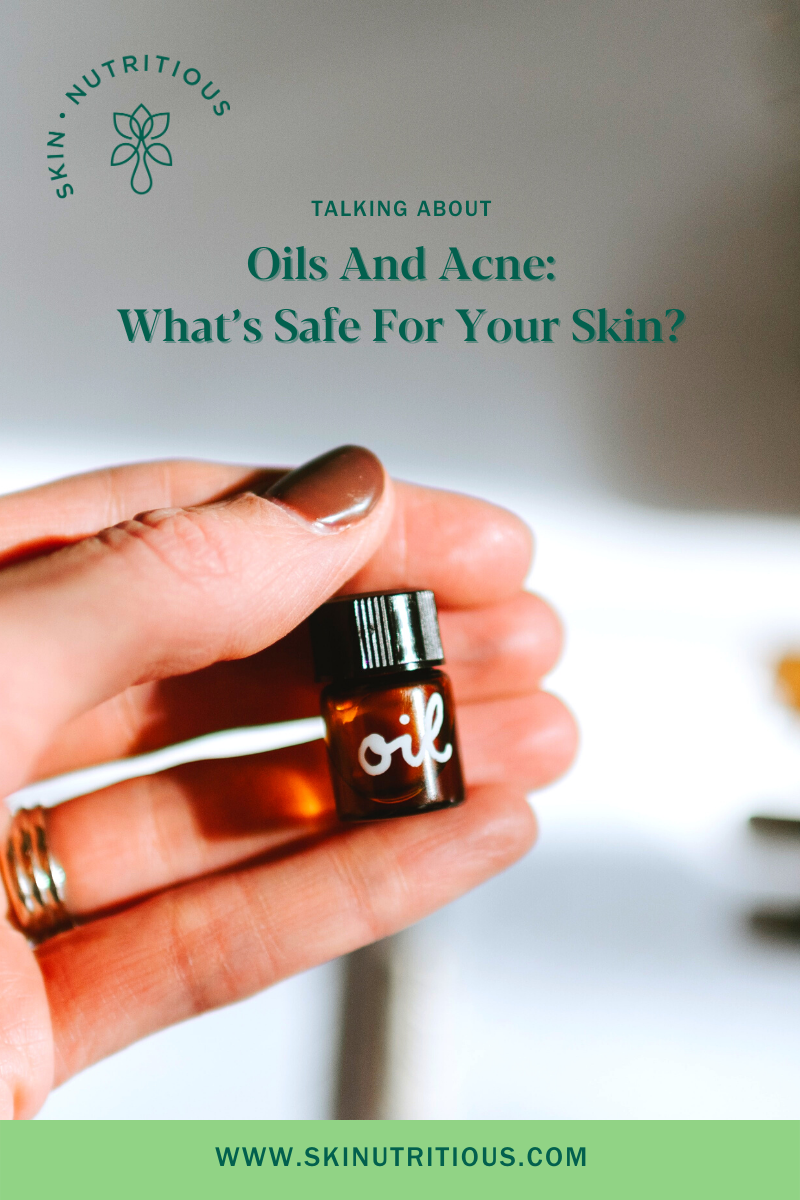Oils and Acne: What's Scientifically Safe For Your Skin?

Acne people have a love-hate reputation with oils. Several decades ago, the popular recommendation was for acne-prone skin to avoid oils. And many of us notice breakouts when we use them.
Yet today, natural skincare products are loaded with oils and the clean beauty movement has exploded in popularity.
There are thousands of websites touting the benefits of using oils on the skin. So what does the science say for acne people?
Oils can be fantastic and there is a right fit for everyone. But acne-prone people have to be a little more careful about which kind of oils they use.
The reason is its comedogenicity - or pore-clogging factor. Many oils have been tested and only a few have been found safe for acne-prone skin. Here is an easy list of which oils are safe and which are not.
Oils SAFE for Acne
-
Sunflower oil. Rated a 0 out of 5 in the 1989 Dr. Fulton comedogenic study, this oil is safe for use on acne-prone skin. A "0" on the comedogenic scale means no clogged pores were found when the oil was used on the skin. Many other oils were found to be comedogenic.
I hand make my Botanical Oil Cleanser with non-comedogenic sunflower oil. Not only is it acne-safe, but it is also a pure-oil product, undiluted with other fillers that reduce the oil percentage. If you love oil cleansers, please check yours for comedogenic ingredients. It is very common. And switch to my Botanical Oil Cleanser for a known acne-safe, high integrity product!
-
Safflower oil. Also rated a 0 out or 5 again in the Dr. Fulton study.
-
Jojoba oil. To call jojoba an "oil" is actually a little misleading. It's technically a wax and its composition makes it the closest compound to our own natural sebum production. In a sense, using this oil is like lathering your face in your body's own natural oil. This was found to have a rating of 0-2 depending on the raw material provider.
I recommend to use the highest quality of jojoba possible. Because it is a more expensive oil, some suppliers may dilute it. Be sure to read ingredients and if you do use a jojoba that you find breaks you out, best to switch to another higher-end brand you can trust. Check my out my Jojoba Glow Moisturizer for a great option that my client studies have shown a very safe option for acne-prone skin!
-
Essential oils are potent extractions of plants and herbs. This includes tea tree, clove, lavender, mandarin, sweet orange, bergamot, tangerine, and turmeric just to name a few. These are always safe for acne-prone skin, however they should always be diluted and never used directly on the skin.
Oils NOT SAFE for Acne
This is where things get a little tricky. What may be good for someone else's skin may not be good for yours. Everyone has an oil that is right for them, this is just a list to avoid if you have acne. If you don't have acne, you generally don't have to worry about what oils you use (as far as clogs go). So while your friend with dry skin may rave about cleansing with olive oil, slathering that on your breakout-prone skin will cause your face to explode in clogs. Here are the oils to avoid:
-
Almond oil
-
Apricot kernel oil
-
Avocado oil
-
Beeswax (cera alba)
-
Cocoa butter
-
Coconut oil
-
Corn oil
- Cotton seed oil
- Flaxseed oil
- Grapeseed oil
- Olive oil
- Palm oil
- Peach kernel oil
- Peanut oil
- Sesame oil
- Soybean oil
- Sweet almond oil
- Wheat germ oil
- Vitamin E oil (tocopherol). This is generally safe if used in <2% of the product, but at 10-100%, it can cause clogs on the skin. It is very thick and unbreathable.
The Unknown Oils
All other oils not listed here have not been tested for comedogenicity (pore clogging). This includes hemp, argan, castor oil, and many more. Because they have not been tested, I recommend to play it safe rather than sorry and avoid using them if you have acne.
Another note here - oils generally do not clear acne. They can be used to help support the clarity of skin, but if you have acne the best way to clear it is to find the root cause and make the changes necessary to allow your body to balance naturally. I will be writing an upcoming blog article on which ingredients fight acne. It's worth knowing what to have in your corner!
Resource List:
1. Download my Official Comedogenic Ingredients List. If you're sensitive to acne, you need to be checking every product you use on your face with this list. Over 90% of my new clients are using them and have no idea.
2. Shop Skin Nutritious for 100% non-comedogenic, acne-safe products. I made this line because the natural products I found weren't for acne, and the acne products weren't natural. This line is the integrity of holding both and has been refined by over 1,300 client studies.
3. Check my pre-screened Makeup for Acne List for foundations, concealers, powders, sunscreens, and more. I have already checked them for comedogenic ingredients so you don't have to.
In love, health, and community,


Elise May, CN + LE, is a holistic esthetician, acne nutritionist, and founder of Skin Nutritious. Since 2011, she has helped over 1,600 clients overcome acne with a unique blend of coaching, treatments, and holistic skincare.
Work with Elise at her San Francisco acne clinic or virtually worldwide! View services + book online here.
.
.
The entire contents of this website are intended as a sharing of knowledge and information from the research and experience of Elise May, Skin Nutritious, and her community. Skin Nutritious encourages you to make your own health care decisions based upon your research and in partnership with a qualified health care professional. The information on this website is not intended to replace a one-on-one relationship with a qualified health care professional and is not intended as medical advice. These statements have not been evaluated by the Food and Drug Administration. This product is not intended to diagnose, treat, cure, or prevent any disease.




